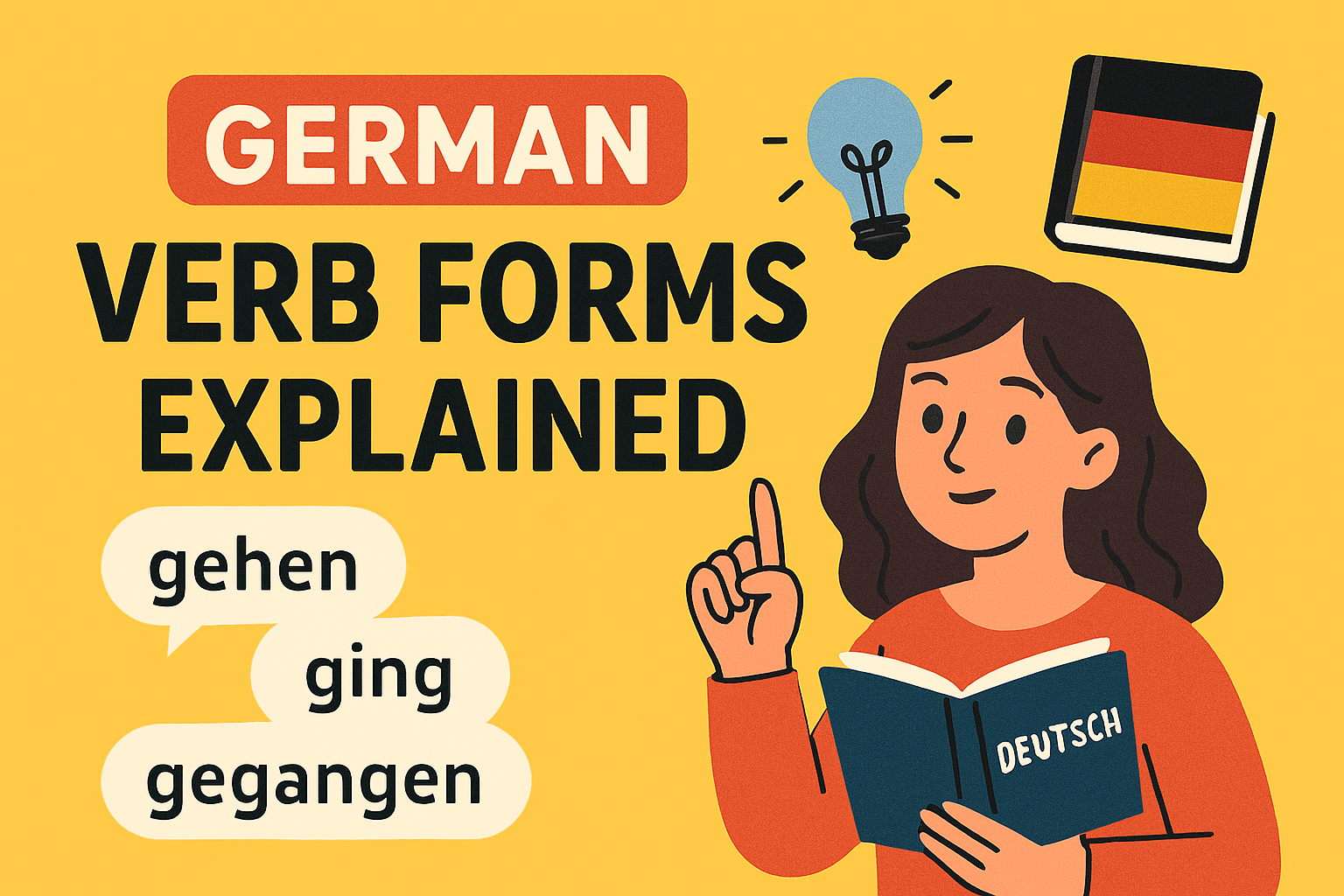Table of Contents
German is not an easy language to learn. This is known to all language learners. The grammar rules in German can be so complicated that trying to learn them may feel like unlocking a code. This is especially true when it comes to verb forms in German. But understanding them is important because they are the key components to understanding and speaking the language correctly. Whether you are just a beginner or someone aiming to ace a B1-level German proficiency exam, mastering verb forms in German is essential.
Get the best mentors to learn German! Join Entri’s German language proficiency online course!
Verb forms in German: Introduction
The verb forms in German indicate the different ways in which a verb can appear in a sentence according to:
- Who is doing the action (person)
- How many people (number)
- When the action happens (tense)
Verb forms in German are the foundation on which the sentence is constructed. Choosing the correct verb form determines your clarity and accuracy of your communication, whether it’s speech or writing. Understanding how verbs change with tense, subject, and type (modal, reflexive, etc.) is essential for fluency from A1 to B1. And the objective of this blog is to teach you exactly these.
German Verb Forms Explained: A Complete Guide for Beginners to B1 Learners
1: How do you say "Good Morning" in German?
The aim of this blog is to give you a comprehensive idea about verb forms in German. Let us learn.
Free German A1 Mock Tests – Powered by AI!
Test your skills on our interactive platform. Get instant feedback from our AI to help you communicate better and track your progress. Start your free German mock test now.
Test Your German A1 for FreeBasic Verb Forms in German
Let us start from the basic verb forms in German itself.
| Verb Form | Usage | German Example(s) | English Meaning |
| Infinitive |
|
|
|
| Present Tense (Präsens) |
|
|
|
| Past Tenses |
|
|
|
| Future Tense (Futur I) |
|
|
|
Conjugation by Person & Number
Another important factor is that verb forms in German must agree with the subject. The person and number of the subject impact the verb form used in the sentence. Let us look at the table below; the examples of conjugation with “spielen” as a model verb are given.
| Person | Pronoun | Conjugation |
| 1st singular | ich | spiele |
| 2nd singular | du | spielst |
| 3rd singular | er/sie/es | spielt |
| 1st plural | wir | spielen |
| 2nd plural | ihr | spielt |
| 3rd plural/formal | sie/Sie | spielen |
Regular vs Irregular Verb Forms
Now, we have to learn about regular and irregular verb forms in German. What you have to keep in mind is that there is no fixed rule in how they might change. Regular verbs (schwache Verben) follow some conjugation patterns. But the irregular verbs (starke verben) don’t do this. So, the only way to learn irregular verbs is to learn and memorize them individually. Learn them like you learn vocabulary. Take a look at the table below for better understanding.
| Type | Description | Examples | English Meaning |
| Regular Verbs i.e. schwache Verben |
|
machen → machte, gemacht | to do → did, done |
| Irregular Verbs i.e. starke Verben |
|
essen → aß, gegessen
fahren → fuhr, gefahren |
to eat → ate, eaten to
drive → drove, driven |
Free German A1 Mock Tests – Powered by AI!
Test your skills on our interactive platform. Get instant feedback from our AI to help you communicate better and track your progress. Start your free German mock test now.
Test Your German A1 for FreeModal Verbs and Their Forms
The role of a modal verb is to modify the meaning of another verb. They often represent ideas like ability, permission, etc. Let us take a look at common modal verb forms in German.
| German Verb | English Meaning | Usage Example (German) | English Translation |
| können |
|
Ich kann singen. | I can sing. |
| müssen |
|
Ich muss lernen. | I must study. |
| dürfen |
|
Ich darf gehen. | I may go. |
| wollen |
|
Ich will schlafen. | I want to sleep. |
| sollen |
|
Ich soll helfen. | I should help. |
| mögen | like (to) | Ich mag Pizza essen. | I like to eat pizza. |
Modal Verbs and Person of Subject
It should also be noted that modal verbs in German change forms according to the person of the subject. Look at the table below.
| Person | müssen (must) |
| ich | muss |
| du | musst |
| er/sie/es | muss |
| wir | müssen |
| ihr | müsst |
| sie/Sie | müssen |
Modal Verbs and Tense
It also changes according to the tense in the sentence. The table below will give you a better understanding of this matter.
| Tense | können (can) | müssen (must) | dürfen (may) | English Translation (ich-form) |
| Infinitive | können | müssen | dürfen |
|
| Present (Präsens) | ich kann | ich muss | ich darf |
|
| Simple Past (Präteritum) | ich konnte | ich musste | ich durfte |
|
| Present Perfect( Perfekt)* | ich habe spielen können | ich habe gehen müssen | ich habe kommen dürfen |
|
| Future(Futur I) | ich werde spielen können | ich werde gehen müssen | ich werde kommen dürfen |
|
Some tips to keep in mind in this scenario are given below:
- In Perfekt and Futur I, modal verbs are usually used with another verb in the infinitive.
- Modal verbs are irregular in most forms, especially in Präteritum.
- In spoken German, Perfekt is often used instead of Präteritum for modal verbs.
|
German A2 Exercises – Download Free PDF |
||
Reflexive Verbs & Their Forms
Reflexive verbs are the verbs that need the support of a reflexive pronoun like myself, yourself, etc. For example:
sich waschen (to wash oneself)
This changes according to the pronoun they are used with. For instance, look at the table below.
| Pronoun | Conjugation |
| ich | wasche mich |
| du | wäschst dich |
| er/sie/es | wäscht sich |
| wir | waschen uns |
| ihr | wascht euch |
| sie/Sie | waschen sich |
Separable and Inseparable Verbs
Then come the separable and inseparable verbs. Separable prefixes often denote motion, direction, or completion, while inseparable prefixes denote more abstract or result-focused actions. The table below will give you a comprehensive idea about how things work in this scenario.
| Type | Description | Example Verb | Sentence (German) | Translation (English) |
| Separable Verbs |
|
aufstehen (to get up) | Ich stehe früh auf. | I get up early. |
| Inseparable Verbs |
|
verstehen (to understand) | Ich verstehe dich gut. | I understand you well. |
Some common verb prefixes in German are given below.
| Separable Prefixes | Inseparable Prefixes |
| · auf-
· an- · mit- · ab- · ein- |
· be-
· ge- · er- · ver- · zer- |
A few rules that are followed by separable prefixes are listed below.
| Rule | Explanation |
| Prefix moves to the end in main clauses | In the present and simple past, the prefix detaches and goes to the end. |
| Prefix stays attached in subordinate clauses | In clauses introduced by weil, dass, etc., the prefix does not separate. |
| Prefix stays attached in infinitive forms | When using modal verbs or infinitives, the verb is not split. |
| Past participle uses ‘ge-‘ between prefix and stem | Most separable verbs use ge- between the prefix and stem in Perfekt. |
Some rules that are followed by inseparable prefixes are listed below.
| Rule | Explanation |
| Prefix never separates | In all tenses and clauses, the prefix stays attached. |
| No ‘ge-‘ in past participle | Inseparable verbs do not add ge- in the Perfekt. |
| Same infinitive rules as normal verbs | Infinitive stays unchanged and attached. |
Common Mistakes to Avoid
There are some common mistakes to avoid while using verb forms in German. A few of them are listed below.
| Mistake | Incorrect Example | Correct Example | Explanation |
| Using Perfekt with modal verbs incorrectly | Ich habe können gehen. | Ich habe gehen können. | The modal verb infinitive goes to the end. |
| Confusing singular and plural ‘you’ forms | du spielst /ihr spielt (both used interchangeably) | du spielst (singular)/ ihr spielt (plural) | du = you (singular), ihr = you (plural) |
| Forgetting reflexive pronouns | Ich wasche. | Ich wasche mich. | Reflexive verbs need reflexive pronouns. |
Tips to Learn Verb Forms Effectively
Here, we will give you some tips to learn verb forms in German effectively.
- Make flashcards for irregular verbs.
- Read short German stories to see verbs in context.
- Practice speaking and writing daily.
- Group verbs by type: regular, irregular, modal, reflexive, etc.
- Join an online German language course, like the Entri Elevate German course.
The Entri Elevate German language proficiency course will offer you everything you need to learn German.
|
Goethe 2025 Exam Dates: Multiple Test Centers |
|
| Trivandrum Goethe Exam Dates | Kochi Goethe Exam Dates |
| Chennai Goethe Exam Dates | Coimbatore Goethe Exam Dates |
Verb Forms in German: Conclusion
Verb forms in German can look overwhelming at the first glance. But mastering them is essential for achieving fluency and accuracy in your German speaking as well as writing skills. The key to mastering them is nothing but practice. With constant practice and help from expert mentors, even B1-level learners can learn to confidently use complex tenses and verb types. Start small, focus on patterns, and don’t be afraid to make mistakes. Happy learning!
Free German A1 Mock Tests – Powered by AI!
Test your skills on our interactive platform. Get instant feedback from our AI to help you communicate better and track your progress. Start your free German mock test now.
Test Your German A1 for FreeFrequently Asked Questions
Is “du spielst” the same as “ihr spielt”?
No. du spielst = you (one person) play; ihr spielt = you all play.
Can I use modal verbs in Perfekt?
Yes, but the structure is: haben + main verb + modal verb at the end.
Example: Ich habe gehen können.
What are reflexive verbs?
Verbs that require a reflexive pronoun (like sich), e.g., Ich wasche mich (I wash myself).
What is a verb form in German?
It’s how a verb changes based on the subject, tense, or mood—like spielen → ich spiele or ich spielte.
What’s the difference between Präteritum and Perfekt?
Both describe the past. Präteritum is mostly used in writing, while Perfekt is more common in speech.
How do I know if a verb is separable?
Look at the prefix—if it’s something like “auf-” or “mit-,” it’s likely separable. Check if it moves to the end in a sentence.











